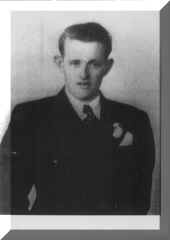The Murder of Seamus Ludlow in County Louth, May 1976. Towards a public inquiry?



The Murder of Seamus Ludlow in County Louth, May 1976. Towards a public inquiry?
|
|
Introduction to the murder of Seamus Ludlow and the official cover-up. Michael Cunningham investigation - 1978 The recent Campaign for Truth and Justice. Irish Victims Commission Report. Ludlow family's questions for the RUC (now the PSNI). Jim J. Kane's letter to the N I Human Rights Commission. Jim J. Kane's letter to the RUC Ludlow Family Letter to Bertie Ahern View messages from our original Guestbook Other Ludlow Family Sites.
|
The Irish Examiner, 12 August 2000: When a state turns to murderBook Review
I ran up to Linden Street corner and there were a few people trying to give aid to the unconscious victim who was lying on her back, dressed in a housecoat and wearing, I think, a pair of slippers. I asked somebody what happened and was told: "She was hit with a plastic by the cops!" Her head had swollen to twice the normal size and her face was growing purple. An ambulance arrived, she was taken away and I went back to work. The mother-of-three died the following day from skull and brain injuries and it was only then I learnt that it was Nora McCabe, or, as I knew her before she got married, Nora Cosgrove. I couldn't connect the 33-year-old woman lying disfigured on the ground with my neighbour from Iveagh Street, the woman who I had been joking with in our local club the previous New Year's Eve, the woman whose brother I had been inside with, the woman who as a young teenager had been a bit of a tomboy and collected bonfire wood with us for Our Lady's Day, August 15. The inquest into her death opened in November 1982. One eyewitness, Jean Mooney, said that when Joe McDonnell's death was announced she and 15 other women went to their street corner at the junction of the Falls Road to say the Rosary. She saw an RUC Land Rover turn into Linden Street and stop. As it did so, she heard a bang, saw sparks coming from the Land Rover and saw Nora McCabe fall. Nora was no more than 10 feet from the Land Rover. All of the RUC witnesses, bar one, were identified by letters only. They denied having pulled into Linden Street, nor firing plastic bullets into that street. They insisted that the plastic bullets they fired were at petrol- bombers in the next street, Clonard Street. Chief Superintendent James Crutchley admitted that he had been in charge of the patrol and gave the order to fire. The inquest should have been an open-and-shut case: the truthful, trustworthy RUC's word against disreputable locals. It was then that the family solicitor Pat Finucane (himself later assassinated by loyalists in collusion with British intelligence) produced a film taken by two Canadians which showed exactly what happened. The coroner immediately adjourned the inquest to allow time for the authenticity of the footage to be checked. The inquest resumed a year later, the film was accepted as authentic and it was shown to the court. It showed two RUC Land Rovers driving up the Falls Road. One turned into Linden Street and as it did so, a bang was heard and smoke was clearly visible emerging from a black object sticking out of the side of the vehicle. No petrol bombs had or were being thrown. The RUC continued to deny it had fired into Linden Street. The jury declared: "There is no clear evidence to suggest that there was a legitimate target to be fired at in that street. Neither is there evidence to suggest the deceased was other than an innocent party." Nora McCabe had gone out for a packet of cigarettes and came home in a coffin. No RUC officers were released from the H-Blocks under the Good Friday Agreement because not one of them was ever prosecuted, ever jailed. On the contrary, they were promoted: one to chief inspector, one to sergeant, and James Crutchley became the assistant chief constable of the RUC. One afternoon in May 1976 two men out walking near Dundalk came across the body of 47-year-old bachelor Seamus Ludlow. He had been shot 21 times. The highlight of Ludlow's week was to go drinking on a Saturday afternoon and evening in Dundalk, then hitch home. After his death the gardaí made active inquiries for about four weeks, searching houses, stopping vehicles at checkpoints. Then the investigation suddenly ceased. Unofficially the family were told that the murder was the work of the IRA and that Seamus must have been a suspected informer. Twenty years later a journalist and a garda detective told the family that it was loyalists, not the IRA, who killed their relative. In March 1988, a former UDA man, Paul Hoskings, told a Sunday newspaper that on that fateful day back in 1976 he had been out drinking with loyalist paramilitaries who included a captain and an officer in the Ulster Defence Regiment. They had gone to Dundalk and picked up Ludlow on their way back to the border. Hoskings named the loyalist who shot Ludlow in the back of the car. Hoskings told the paper that years later he had been questioned by the RUC Special Branch who "seemed to know all the story" already. After these revelations an inquiry into the case was assured by Taoiseach Bertie Ahern last September. But in October the DPP announced that there would be no prosecutions. Two of Ludlow's relations, Michael Donegan and Jimmy Sharkey, are now demanding a public inquiry into Seamus's death, why they were told lies and why the original investigation was so quickly abandoned. Some of the questions being asked are: was there an informant or British intelligence agent among the gunmen who had to be protected, did senior gardaí collude in a cover-up, and had perhaps the gardaí itself been infiltrated by MI5? The above are just two examples from Unfinished Business which tells the stories of some of those killed by British forces and their agents, which account for 10% of the deaths in the conflict, 88% of the victims of state killings were from the nationalist community. The accounts of their deaths and their families' search for justice and closure are heartbreaking. In his introduction Bill Rolston analyses the way a hierarchy-of-victims emerged in state and media presentation of fatalities; in fact, what emerged were two classes of victims, deserving and undeserving, with the latter "presumed to be less than innocent, or worse, downright culpable". Into that category, falls the woman who went out for a packet of cigarettes, and the child who went out for a pint of milk only to be "caught up in riots" that never were. When wars end, says Rolston, it is time to turn to and resolve that unfinished business -- what really happened, the truth. The truth that was mangled, suppressed, distorted. This is a powerful, sad, moving testimony to those who suffered mean deaths at the hands of the all-mighty, at the hands of those who literally got away with state murder
The Dundalk Democrat, 24 June 2000: Amnesty supports family's fight for public inquiry I Homepage I I Top
I I Press Coverage I I Barron
Inquiry I I Terms of reference for Barron
Inquiry I I Fresh Inquest I I Celtic
League Support I I New
GuestMap Guest Book.
I
|